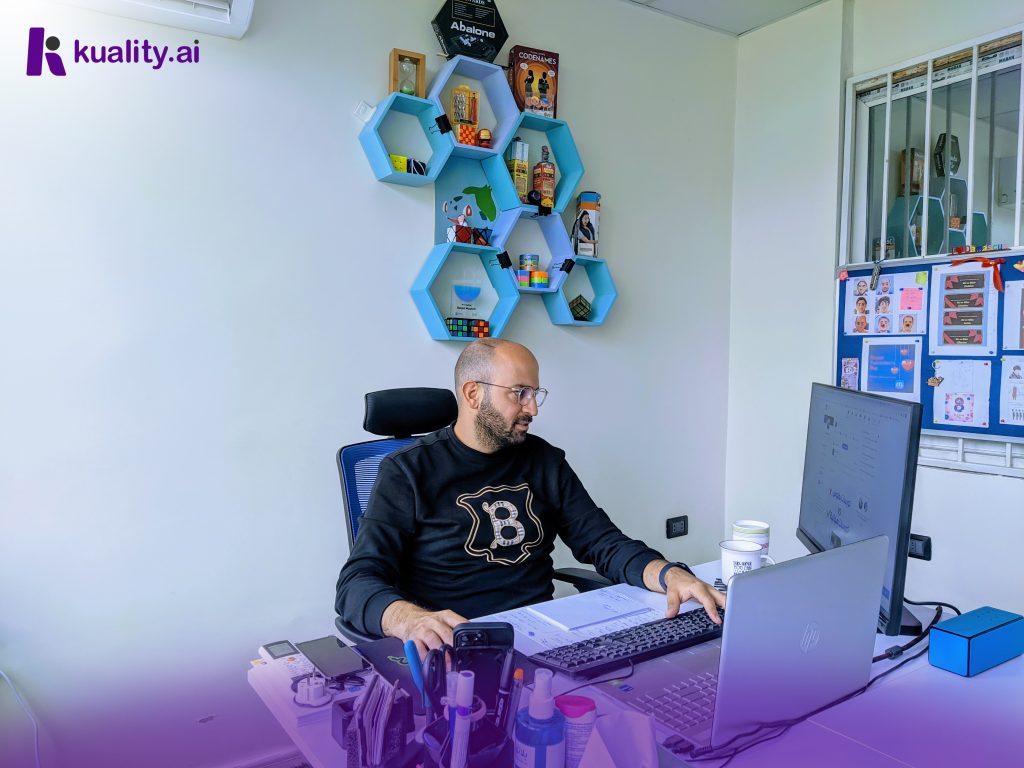
Bahjat is a seasoned Human Resources Manager at Kuality AI, This Emirati company is on a mission to make the world a safer place by using artificial intelligence to tackle tricky challenges. And lucky for us, Bahjat is here to talk about how AI affecting the job market and what it means for the middle class, and how governments and educational institutions can prepare for the AI revolution.
From humanitarian work to the world of AI
Bahjat began his 12-year career in human resources at a non-governmental humanitarian organization. He later moved on to work in various industries, including tourism and software, before joining Kuality AI. Drawn to the company’s innovative technology and global impact, Bahjat is now an integral part of a team dedicated to improving safety and security services.
Defining the middle class and their Role in the labour market
When asked about the definition of the middle class, Bahjat explains that middle-class jobs are professional, non-manual positions that contribute significantly to global economic growth. These jobs often require at least an associate’s or bachelor’s degree and include a wide range of professions, such as engineers, accountants, construction workers, and medical technicians.
The Impact of AI on the labour market and the UAE
Bahjat acknowledges the fear surrounding the rapid development of AI and its potential to replace human labour. He believes that while developing Arab countries may be affected by these changes, the United Arab Emirates has been proactive in embracing AI and preparing its infrastructure and workforce for the new era.
Middle-class jobs and the AI revolution
Despite the concerns for middle-class jobs in the face of the AI revolution, Bahjat contends that it’s difficult to predict which specific professions will be most affected. He emphasizes the importance of continuous self-improvement and adapting to the latest advancements in AI to stay relevant in the job market.
Staying Competitive in the Age of AI
In order to remain competitive in industries affected by AI, Bahjat suggests that middle-class workers constantly update their knowledge and skills to keep up with the rapid pace of technological advancements. He also highlights the importance of integrating AI into various fields, such as human resources, where it now plays a significant role in tasks like applicant sorting and candidate selection.
Preparing for the future with AI
To help middle-class workers stay relevant in the evolving labour market, Bahjat believes that governments and educational institutions should invest in the necessary infrastructure for AI development. This includes incorporating AI concepts into educational curricula, improving internet quality and speed, and providing advanced equipment and resources.

Ensuring equitable distribution of AI benefits
Bahjat recognizes that AI has the potential to replace many human tasks, including some of his own responsibilities. However, he argues that AI cannot yet replicate the emotional intelligence and nuanced understanding of human moods that are essential to his role as a human resources manager. This unique advantage allows him to remain competitive in the face of AI advancements.
Kuality AI’s commitment to employee growth
As a company at the forefront of AI technology, Kuality AI is dedicated to ensuring its employees are equipped with the skills needed to adapt to AI advancements. Bahjat shares that they actively work on developing and training individuals to help them transition into new roles that align with the rapid pace of technological progress.
The Future of Skills and Education in the Age of AI
Bahjat asserts that the labour market and its required skills and education are constantly evolving. He envisions the birth of new sciences and skills that were once unimaginable, urging both individuals and educational institutions to adapt and grow alongside these developments.
In conclusion, Bahjat’s insights provide valuable guidance for middle-class workers, governments, and educational institutions as they navigate the challenges and opportunities presented by the AI revolution. By staying informed, embracing change, and investing in personal and collective growth, we can ensure a brighter future for all in the age of AI.

